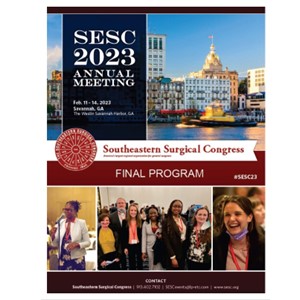Trauma
Category: Plenary Session 1
Quickshot Oral : Plenary Session 1
1 - INCIDENTAL FINDINGS PROTOCOL IMPLEMENTATION AT A LEVEL-I TRAUMA CENTER: A REVIEW OF PATIENT FOLLOW UP
Sunday, February 12, 2023
9:10am - 9:25am East Coast USA Time

Lindsey L. Perea, DO, FACS
Adjunct Assistant Professor of Surgery
Penn Medicine Lancaster General Hospital, United States- SM
Sarah Martin, DO
United States
Principal Contact(s)
Presenter(s)
Objectives: Pan-scanning in trauma patients has become routine, resulting in increased identification of incidental findings. Incidental findings are findings unrelated to the reason for the scan. This has posed a conundrum of ensuring patients have appropriate follow up for these findings. We sought to evaluate our compliance and follow up for patients after implementation of an incidental findings protocol at our level-1 trauma center.
Methods: The trauma registry at our Level-1 Trauma Center was queried from 9/2020-4/2021, to encompass our pre and post implementation period. Patients were separated into PRE and POST groups. Charts were reviewed evaluating several factors including three and six-month follow-up on incidental findings. Data was analyzed comparing PRE and POST groups.
Results: A total of 1989 patients were identified with 31.22% (n=621) having incidental findings. Nine patients were excluded. As a result, 612 patients were included in our study. There was a statistically significant increase in PCP notification, 35% vs 22% (p < 0.001), and patient notification, 82% vs 65% (p < 0.001) in the POST v. PRE group. As a result, patient follow up regarding incidental findings was significantly higher in the six month follow up interval, 29% PRE vs 44%. There was no statistically significant difference in follow up based on insurance carrier between PRE and POST groups. Of the patients that followed up, most patients had Medicare insurance in both PRE (34.6%) and POST (53.5%) groups. There was no significant difference in patient age for PRE and POST group overall, 63 vs 66 years (p=0.089); nor in age of patients who followed up between both groups; 68.8 vs 68.2 years (p=0.819).
Conclusion: Implementation of an incidental findings protocol with patient and PCP notification resulted in statistically significant improvement in overall patient follow up for category 1 and 2 incidental findings. Patients who followed up were more often discharged to home. Utilizing the results obtained from the study, the protocol will be further revised to improve patient follow up.
Methods: The trauma registry at our Level-1 Trauma Center was queried from 9/2020-4/2021, to encompass our pre and post implementation period. Patients were separated into PRE and POST groups. Charts were reviewed evaluating several factors including three and six-month follow-up on incidental findings. Data was analyzed comparing PRE and POST groups.
Results: A total of 1989 patients were identified with 31.22% (n=621) having incidental findings. Nine patients were excluded. As a result, 612 patients were included in our study. There was a statistically significant increase in PCP notification, 35% vs 22% (p < 0.001), and patient notification, 82% vs 65% (p < 0.001) in the POST v. PRE group. As a result, patient follow up regarding incidental findings was significantly higher in the six month follow up interval, 29% PRE vs 44%. There was no statistically significant difference in follow up based on insurance carrier between PRE and POST groups. Of the patients that followed up, most patients had Medicare insurance in both PRE (34.6%) and POST (53.5%) groups. There was no significant difference in patient age for PRE and POST group overall, 63 vs 66 years (p=0.089); nor in age of patients who followed up between both groups; 68.8 vs 68.2 years (p=0.819).
Conclusion: Implementation of an incidental findings protocol with patient and PCP notification resulted in statistically significant improvement in overall patient follow up for category 1 and 2 incidental findings. Patients who followed up were more often discharged to home. Utilizing the results obtained from the study, the protocol will be further revised to improve patient follow up.

